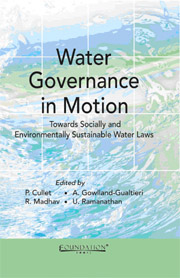Book contents
- Frontmatter
- Contents
- Acknowledgments
- Contributor Biographies
- Introduction
- I Water Law, Policy and Institutional Reforms in India
- II Ongoing Irrigation and Ground Water Reforms in India
- III Perspectives on Privatisation
- IV Environment and Human Rights
- V Comparative Perspectives on Reforms
- 16 Learning from Water Law Reform in Australia
- 17 Law and ‘Development’ Discourses About Water: Understanding Agency in Regime Changes
- 18 Marginal Remarks Concerning Water Policy Regimes; Governance, Rights, Justice, and Development: An Epilogue
- Bibliography
17 - Law and ‘Development’ Discourses About Water: Understanding Agency in Regime Changes
from V - Comparative Perspectives on Reforms
Published online by Cambridge University Press: 26 October 2011
- Frontmatter
- Contents
- Acknowledgments
- Contributor Biographies
- Introduction
- I Water Law, Policy and Institutional Reforms in India
- II Ongoing Irrigation and Ground Water Reforms in India
- III Perspectives on Privatisation
- IV Environment and Human Rights
- V Comparative Perspectives on Reforms
- 16 Learning from Water Law Reform in Australia
- 17 Law and ‘Development’ Discourses About Water: Understanding Agency in Regime Changes
- 18 Marginal Remarks Concerning Water Policy Regimes; Governance, Rights, Justice, and Development: An Epilogue
- Bibliography
Summary
Introduction
Two events of significance for freshwater resources in the ‘Third World’ occurred in 1997. The World Bank (WB) set up the World Commission on Dams (WCD) in March 1997. In May 1997 the United Nations (UN) General Assembly adopted the United Nations Convention on Non-navigational Uses of International Watercourses in May 1997 (UN Water Convention). The first development was the culmination of a sustained critique of large dams by environmental and social justice movements in the ‘Third’ and ‘First’ worlds alike. The critique of large dams occurred in the context of the rise of neoliberal transformations within International Organisations (IO). The second was the culmination of sustained efforts to create a legal framework to resolve transboundary conflicts over freshwater and pave the way for transboundary institutions for water projects and dispute resolution. Development of the UN Water Convention spanned nearly all of the post-World War II period of economic ‘development’ and concluded against the context of rising concerns about ‘water wars’ and security.
Both events were, ex facie, about dams and development but nevertheless ramifying legal, institutional, local and global changes for water regimes in the ‘Third World’. Yet the discourses around the two events ran parallel without convergence or contestation, intra-discourse, seen at best, as a coincidence. There is nothing in the events per se that suggest the possibility that there might be anything more to the absence of connections in the discourses on the two events.
- Type
- Chapter
- Information
- Water Governance in MotionTowards Socially and Environmentally Sustainable Water Laws, pp. 477 - 509Publisher: Foundation BooksPrint publication year: 2010
- 2
- Cited by

